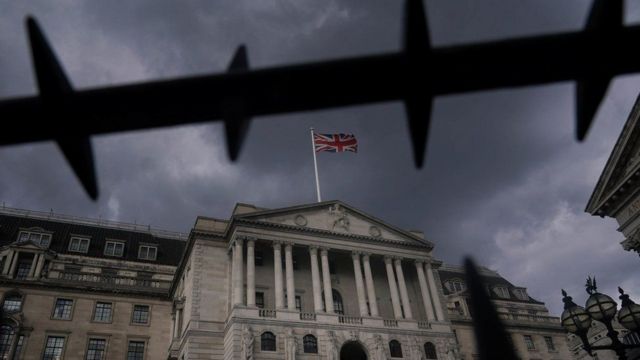
Source, PA Media
The turmoil caused by the tax package announced by the British government on Friday continues in the markets.
The government’s budget, announced on Friday, has created financial chaos in the country as it prompted investors to sell pounds and bonds. Sterling’s value hit record lows on Monday.
The Bank of England, on the other hand, announced that it will make temporary purchases in long-term bonds by intervening in the markets.
The UK MB has announced that it will make temporary purchases of long-term bonds to maintain order in market conditions.
The auctions will run until October 14.
This means that the institution will spend £5 billion a day for 13 days to calm the markets, according to the report of the Financial Times newspaper.
However, there is a concern that this situation may lead to an increase in inflation in the UK, where prices have already risen.
The pound rose 1% against the dollar after the announcement.
The International Monetary Fund, the IMF, on the other hand, openly criticized the UK government’s tax cut plans and warned that the measures would worsen livelihoods.
BBC economic correspondents According to Natalie Sherman and Tom Espiner, the IMF said in an unusually frank written statement that tax cuts would likely worsen inequalities and create new pressure that drove prices up.
Source, Getty Images
The tax cut package announced by Finance Minister Kwasi Kwarteng found a negative response in the markets.
The government’s goal is to grow
The government says the measures will restart economic growth.
In the biggest tax cut package the country has seen in the last 50 years, it is foreseen that the cost of the 45 billion pound tax cut will be met with additional debts.
The IMF said the government’s fiscal plan, to be released on November 23, “is an opportunity to reconsider tax measures, particularly those benefiting high-income earners.”
The country’s largest banks have pulled some home loan products from the market due to uncertainty.
“We are focused on the growth of the economy and the improvement of everyone’s living standards,” the Treasury Department said in a statement.
Labor Party: “Government has lost control of economy”
Keir Starmer, leader of the opposition Labor Party, said that “the government has lost control of the economy”.
Emphasizing that housing loans have risen, Starmer emphasized that the government should reconsider the budget in November.
Rachel Reeves, the Labor Party’s Shadow Finance Minister, called on the government to “explain immediately how it will solve the problems” and said, “This statement by the IMF should set off alarm bells in the government and the government should clearly understand that it needs to act now.”
The Bank of England has given the message that it is prepared to raise interest rates in the face of the depreciation of the sterling.
The Bank’s Chief Economist, Huw Pill, said that they “cannot remain unresponsive” to recent developments.
Credit rating agency Moody’s stated that the UK government’s policy would result in higher and persistent budget deficits.
